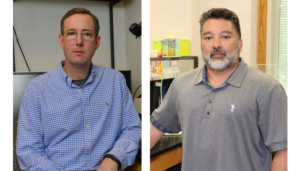University of Missouri features CMT in a video about the project and the role of precision medicine to treat CMT.
 With the recent opening of their new NextGen Precision Health Institute, University of Missouri is quickly rising as a leader in precision medicine. Precision medicine is an approach that develops treatments for individual patients or groups of patients, usually based on their genetic profile, and is quickly becoming a gold-standard approach to treat genetic diseases. In CMT, for example, a precision medicine approach takes into account the results of genetic testing to understand exactly which genes are affected in an individual or a subtype, then seeks to design therapies that are informed by those genetic changes rather than treating all cases of CMT the same.
With the recent opening of their new NextGen Precision Health Institute, University of Missouri is quickly rising as a leader in precision medicine. Precision medicine is an approach that develops treatments for individual patients or groups of patients, usually based on their genetic profile, and is quickly becoming a gold-standard approach to treat genetic diseases. In CMT, for example, a precision medicine approach takes into account the results of genetic testing to understand exactly which genes are affected in an individual or a subtype, then seeks to design therapies that are informed by those genetic changes rather than treating all cases of CMT the same.
Dr. Chris Lorson, a scientist in the NextGen Precision Health Institute at the University of Missouri, is a world-renowned researcher working to develop therapies for two types of CMT. In a collaboration with Dr. Michael Garcia funded by the CMT Research Foundation, they’re addressing CMT2E with a novel approach.
While gene therapy holds promise for people with CMT, it won’t be enough to simply remove the mutated gene for patients with some forms, like CMT2E; the role the gene plays is critical to cell function and nerve health and just silencing the gene would be detrimental. People with mutations in some genes may require a treatment that replaces the signaling from the mutated gene to a normal signal.
The research funded by the CMT Research Foundation carried out by Drs. Lorson and Garcia is developing and testing a new gene therapy that will both silence the abnormal gene and simultaneously replace it with genetic material that will produce normal protein in CMT2E. The first milestone tested different tools to reduce the gene expression of human NEFL (the affected gene in 2E), and three successfully reduced the expression to nearly nothing. One is now selected to move forward into testing in an animal model of CMT2E.
To further expedite the pace of the project, the researchers have selected a model that has the human gene, strengthening the research application to people with CMT. Assuming the knockdown also works in vivo, the researchers will then design and test the full therapy, which will include a gene replacement portion.
If successful, this technique could be applicable for many CMT-causing mutations that require both silencing of a mutated gene and replacement with normal protein — whether the mutation is currently known or has yet to be discovered.
The NextGen Precision Health Institute interviewed CMT Research Foundation co-founder and chief mission offer Susan Ruediger, along with Drs. Lorson and Garcia to highlight their efforts to deliver treatments for CMT.

